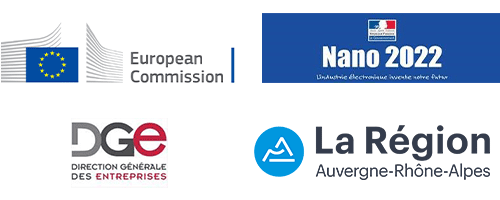
Starting date : May 2018 > Apr. 2021
Lifetime: 36 months

Program in support : ECSEL IA- 2017

Status of project : in progress

CEA-Leti's contact :

Project Coordinator: STMicroelectronics (FR)
Partners:
- DE: CONTI, FhG-IPMS, TUDarm, X-Fab, MLX
FR: CEA-Leti, CNRS-LTM, GEMALTO, Pfeiffer, ST-CRO, ST-GRE, ST-LEM, ST-ROU, ST-SA
- CZ: UTIA, IMA
- TR: Tubitak
- SP: UAB

This project received funding from the JU ECSEL, from the French government as part of the Nano2022 program and from the Auvergne-Rhône-Alpes region.


|
Stakes
CEA-Leti is pushing the performance of embedded PCM (ePCM) in terms of scalability, power consumption, reliability and compatibility with CMOS.
Two major strategies have been defined for improving PCM performance in terms of programming current reduction and enhancing heat confinement of the active cell volume: • Material investigation on a standard cell structure. An outstanding improvement in 4 kbit PCM programming and retention performance has been achieved by integrating a low thermal conductivity, SiC-based encapsulation layer. SiC PCM features included lower programming currents (~20% of reduction compared to SiN-PCM), higher programming speed (~35% faster than SiN-PCM) with data retention of more than 1 hour at 250°C • New cell structure investigation. A novel architecture has been successfully fabricated with PCM material deposited using an «S-shape» structure. We have demonstrated a sixfold reduction in terms of programming current density compared with the classical heater structure.
The aim of the WAKeMeUp project is to set up a pilot line for advanced microcontrollers with embedded non-volatile memories, to design and manufacture the prototypes for innovative applications in the areas of smart mobility and smart society.
The project is targeting industrialization of embedded Phase Change Memory (ePCM) technology built on the FDSOI 28nm logic process pilot line. ePCM development is driven by final application needs and reduction of power consumption.
Existing microcontrollers with 40nm embedded flash technology have been consolidated to build a solid manufacturing platform. Additional developments have included integration of memory, power management, connectivity and strong security into the same chip.
Alternative memory solutions have also been studied; they have different, complementary properties in areas such as read/write speed, power and energy consumption, retention and endurance and device density and are benchmarked with the ePCM and conventional eFlash. Continued improvements in materials, device physics, architectures and design could further reduce the energy consumption of these memories.
The project is deploying all the necessary operations to bring a new technology to early industrial maturity in order to achieve creation of high added value semiconductor circuits in Europe based on breakthrough leading edge technology. These operations encompass developments such as enhanced technology for specific application requirements including wide temperature ranges (up to 165°C) and reliability, high security demands and high flexibility. Design enablement has led to first time silicon success and prototyping of demonstrator products for Smart Mobility and Smart Society.
The WAKeMeUp project has allowed new devices and devices to be developed by the application partners in the automotive and security sectors based on FD-SOI and embedded digital technology that meets specific application needs (power/perfomance/costs).
The WAKeMeUp project will reinforce STMicroelectronics leadership in the microcontroller semi-conductor industry especially in the automotive field.
The project will generate benefits for the European Member States taking part, either in relation to production facilities and/or in academic knowhow, and it is expected to have a positive effect on the labor market. Initial application will be in Europe, followed by introduction worldwide.
|
|